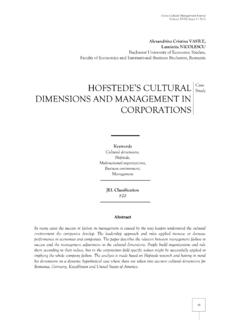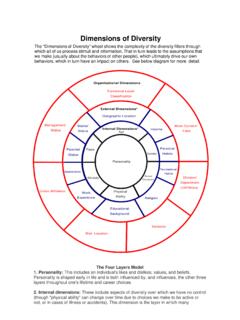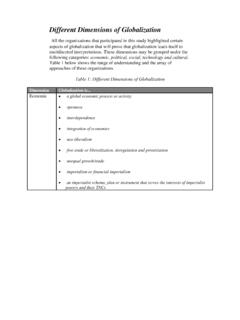Transcription of Guidelines - SIECUS
1 Guidelinesfor ComprehensiveSexuality Education3RD EDITIONNATIONAL Guidelines TASK FORCEK indergartenthrough12thGradeCopyright 2004 by the sexuality Information and education Council of the United StatesNo part of the Guidelines for comprehensive sexuality education : Kindergarten-12thGrade, Third Editionmay be reproduced in any form without written and layout by Anna RaffProofing by Phil Banner and Beej JohnsonPrinting by Fulton PressGuidelinesfor ComprehensiveSexuality Education3RD EDITIONNATIONAL Guidelines TASK FORCEK indergartenthrough12thGradeAcknowledgeme ntsFor over a decade, SIECUS has published the Guidelines for comprehensive sexuality education :Kindergarten-12thGradeto help educators create new sexuality education programs and evaluatealready existing curricula.
2 The Guidelines , developed by a national task force of experts in the fieldsof adolescent development, health care, and education , provide a framework of the key concepts,topics, and messages that all sexuality education programs would ideally include. This Third Edition of the Guidelinesis based on the work of the original National Guidelines TaskForce; the basic structure and content remain the same. Certain topics, messages, and age-levels,however, have been changed to reflect new information and the reality that today s young people are facing. In addition, we have added a section on using theGuidelines that provides specificadvice, ideas, and resources to help educators implement this important framework into their effortsto provide high-quality sexuality education to young people in their schools and communities.
3 Since they were originally developed 13 years ago, the Guidelineshave become one of the mostinfluential publications in the field and a trusted resource for educators, curriculum developers, andschool administrators. SIECUS has distributed well over 100,000 copies of this publication. In fact,the Guidelinesare downloaded from SIECUS website by more than 1,000 people each month. Given how popular and valuable this publication is, undertaking this revision was at the same timeexciting and daunting, and we have many people to thank for the success of the final product. First we would like to thank the John M. Lloyd Foundation and Barbara Stanton whose generous support made it possible for SIECUS to produce this vital resource. We must also thank all of the members of the original task force for the enormity of the task theytook on.
4 There is a phrase in the publishing world that asks Where were you when the page wasblank? Having worked for over a year to update and revise the Guidelines , we cannot imagine theeffort and patience it must have taken to start from scratch. In addition, a number of former and present SIECUS staff members assisted us in updating messagesand adding new information and ideas including Myra Batchelder, Kate McCarthy, Jason Osher,Ambika Panday, Coralie Meade Rodriguez, Darlene Torres, and Adrienne Verrilli. We give special thanksto Amy Levine who spent a great deal of time helping us perfect messages. We would also like tothank Joseph DiNoricia, Jr., SIECUS President and CEO, for his guidance and leadership on this project. Finally, we must thank all of our reviewers.
5 For this edition of the Guidelines , we assembled a panel of experts in the field to review the concepts, topics, and messages. We owe a tremendous debt of gratitude to Nora Gelperin, Eva Goldfarb, Joan Helmich, Maureen Kelly, Lis Maurer, Elizabeth Schroeder,and Bill Yarber. Their comments and ideas were always insightful, often inspirational, and occasionallyhumorous. This revision would not have been possible without their input. It is our sincere hope that this edition of the Guidelinesis a valuable resource for educators and curriculum developers and that it ultimately helps to ensure that all young people receive the comprehensive education about sexuality they need to become sexually healthy adults. Sincerely, Martha E. Kempner, Monica RodriguezDirector of Public Information Vice President for education and TrainingPeggy Brick, Parenthood of Greater NorthernNew Jersey Maureen Corry, March of Dimes Birth Defects Foundation Brenda Green National School Boards Association Debra Haffner, sexuality Information and EducationCouncil of the United States Marian Hamburg, New York University Carol Hunter Geboy Independent sexuality EducationConsultant Richard Jimenez, Centers for Disease Control andPrevention Robert Johnson, New Jersey Medical School Michael McGee, Planned Parenthood Federation ofAmerica JoAnne Pereira sexuality Information and EducationCouncil of the United States Martha Roper, St Louis, Missouri Public Schools Clair Scholz, Irvington.
6 New Jersey Public Schools Robert Selverstone, Westport, Connecticut Public Schools Stanley Snegroff, American School Health Association Mary Lee Tatum, Independent sexuality EducationConsultant Trish Moylan Torruella, Planned Parenthood Federation ofAmerica Katherine Voegtle, American Medical Association James Williams National education Association Pamela Wilson, Independent sexuality EducationConsultant William L. Yarber, University * 1991 affiliations, for identification purposes only. Original Members of the National Guidelines Task Force*Nora GelperinDirector of Training and EducationNetwork for Family Life education atRutgers UniversityEva S. Goldfarb, Professor of Health andNutrition ScienceMontclair State University Joan Helmich, Training Director, Center for Health TrainingMaureen A.
7 KellyVice President of education and TrainingPlanned Parenthood of the SouthernFinger Lakes Elizabeth Schroeder, MSWP rofessional Trainer/Consultant * Affiliations for identification purposes Edition Review Panel*Table of Contents Background and Introduction ..9 History of the Guidelines12 Structure of the Guidelines13 Goals, Values, and Fundamental Principles 17 Guidelines for comprehensive sexuality education : Kindergarten 12th Concept 1: Human Development 22 Key Concept 2: Relationships 31 Key Concept 3: Personal Skills 40 Key Concept 4: Sexual Behavior 48 Key Concept 5: Sexual Health 55 Key Concept 6: Society and Culture 68 Using the Topics79 Filling in the Gaps80 Evaluating Existing Curricula and Lessons 84 Creating New Curricula and Lessons 98 Additional Resources.
8 101 Also IncludedLife Behaviors of a Sexually Healthy Adult 14 Key Concepts and Topics 16 Curriculum Evaluation Tool 87 STDs/HIV Checklist94 Background and IntroductionSexuality education is a lifelong process of acquiring information and forming attitudes, beliefs,and values about such important topics as identity, relationships, and intimacy. The SexualityInformation and education Council of the United States ( SIECUS ) believes that all people have theright to comprehensive sexuality education that addresses the socio-cultural, biological, psychological,and spiritual dimensions of sexuality by providing information; exploring feelings, values, and attitudes;and developing communication, decision-making, and critical-thinking skills. While parents are and ought to be their children s primary sexuality educators, they often needhelp and encouragement.
9 Faith-based institutions, community-based organizations, and schools canplay an important role. SIECUS believes that comprehensive school-based sexuality education should be part of the educationprogram at every grade. Such programs should be appropriate to the age, developmental level, andcultural background of students and respect the diversity of values and beliefs represented in thecommunity. comprehensive school-based sexuality education complements and augments the sexuality education children receive from their families, religious and community groups, and healthcare professionals. SIECUS is not alone in the belief that school-based sexuality education is vitally important to thehealth and well-being of our nation s youth. National, state, and local polls have consistently foundthat a majority of parents want schools to provide comprehensive education about sexuality thatincludes such topics as abstinence, sexually transmitted diseases (STDs)
10 , HIV/AIDS, contraception, anddisease prevention fact, many states mandate that some or all of these topics are cov-ered in school also supports a comprehensive approach to sexuality educationwith numerous studies finding that such programs can help young people delay intercourse, reducethe frequency of intercourse, reduce the number of sexual partners they have, and increase their useof condoms and other contraceptive methods when they do become sexual and schools, however, are often left in the difficult position of trying to determine exactlywhat their sexuality education courses should look like with little or no guidance. For over a decade, SIECUS has published the Guidelines for comprehensive sexuality education : Kindergarten-12thGradeto provide such guidance and help educators create new sexuality education programs andevaluate existing curricula.







